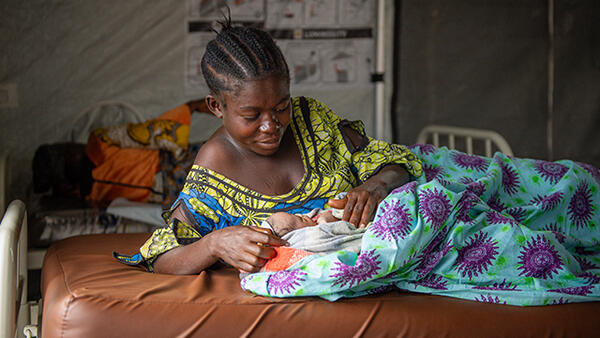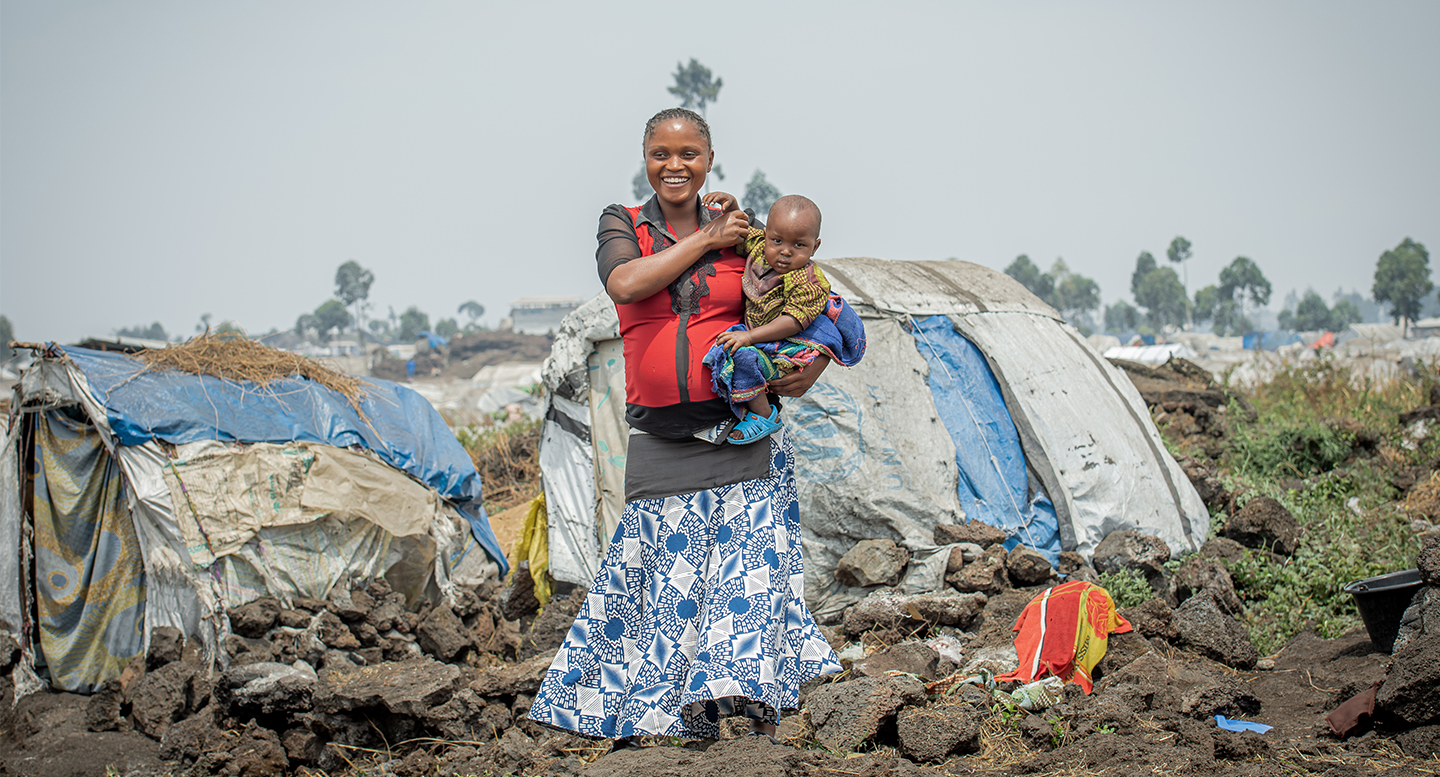Unicef
Violence against children in the Democratic Republic of Congo (DRC) is widespread in all settings, including families, schools, and communities. Nearly one in three women is affected by child marriage, often linked to early pregnancy. Indeed, one in four girls has begun her reproductive life before the age of 18, making the DRC one of the countries in the world with the highest number of children affected by early pregnancy.
In addition, only 40% of children under the age of five are registered with the Civil Registry, and only 13% have a birth certificate. This is due to a registration system that struggles to reach newborns, which is exacerbated in conflict areas.
Across the country, 8 out of 10 children under age 14 are regularly subjected to physical punishment, and 15 percent of children ages 5 to 17 are engaged in child labor. An estimated 10,000 children were still associated with armed groups and forced labor.

Violence against children in the eastern Democratic Republic of the Congo (DRC) has descended to a new low, amid reports that months old twins were found abandoned with explosives strapped to them. UN Children’s Fund (UNICEF) Representative in the country, Grant Leaity, issued the alert on Tuesday, revealing that youngsters in eastern DRC face daily atrocities, including rape, abduction and recruitment by armed groups.
“I visited a centre in Beni and North Kivu for children released from armed groups where I met a couple of one-year-old twins. They were found only a few months back and abandoned in their village, they’re orphans. They were severely acutely malnourished and they had explosive devices attached to their bodies.”
DR Congo has the highest tally of UN-verified grave violations against children in places experiencing armed conflict. According to UNICEF, children are killed and maimed every day in the east of the country. Speaking at a scheduled press briefing in Geneva, Mr. Leaity said that there were “few worse places, if any, to be a child” than eastern DR Congo. According to the UNICEF official, the family of the twins who were wired with explosives had been killed in an attack by one of the many armed groups operating in the eastern DRC.
The expanding use of improvised explosive devices is just one of several recent, depraved trends, he said. “When they were found, there were only a few months old. This was indeed a booby trap. We got in touch with the anti-mine personnel colleagues who came and were able to take these devices off safely.”
This upsurge in violence and conflict in the country’s east has its roots in ethnic conflict and ruthless competition for resources dating back decades. It has resulted in the worst displacement crisis in Africa, and one of the worst globally this year.
Of six grave violations against children in armed conflicts reported on by the UN in eastern DRC, two have increased sharply in the last 12 months: the recruitment of children by armed groups and killing and maiming of children.
“More than 2.8 million children are bearing the brunt of the humanitarian crisis in the east. I am here today to, I hope, sound the alarm,” Mr. Leaity continued. “On a daily basis, children are being raped and killed. They are being abducted, recruited and used by armed groups.”
In the first three months of 2023 in North Kivu alone, more than 38,000 cases of sexual and gender-based violence were reported. This is a 37 per cent increase compared to the same period in 2021.
In addition to the devastating violence, around 1.2 million children under five in the east, face the risk of severe acute malnutrition, according to UNICEF. The country is also experiencing its worst cholera outbreak in more than five years, with measles on the rise in particular in and around 12 provinces with over 780,000 cases reported by August this year.
In addition to the immediate physical and mental trauma affecting children, around 2,000 schools have closed in the eastern DRC in the year, as result of the latest uptick in violence.
“There are schools which are directly attacked…they can be shot at or burned down and sometimes they are literally looted and destroyed,” UNCEF’s Mr. Leaity said.
“But there are far greater numbers where schools are being used by internally displaced people who have no other available options for shelter.”
In many other cases, schools that have not been looted or otherwise damaged have had to remain closed because the teachers are themselves amongst the displaced.
Context
Eastern DRC is one of the most dangerous places in the world for women and girls, the IRC has found.1 As conflict intensifies, so do the atrocious violations and crimes perpetrated against women and children, notably sexual violence, child recruitment into armed groups and abductions. Women and children in the camps around Goma are subjected to dangerous conditions. The camps are overcrowded, shelters are makeshift, there is no lighting at night and hygiene facilities are inadequate, exposing women and girls to abuse. Additionally, civil protection and security measures are minimal.
Outside of the camps, women and girls face sexual violence when travelling in search of income opportunities and firewood for cooking and to generate an income. In times of crisis, women and girls suffer.
When resources are scarce, women and girls are more likely to be subjected to gender-based violence at home, are denied access to essentials, and are forced to engage in negative coping mechanisms to generate income for the family. Girls are forced into marriage to reduce the number of mouths to feed in the household and to gain income from another household.
Loss of income and high food insecurity can lead to spiking violence, abuse and exploitation of women and girls.
The high prevalence of gender-based violence across DRC is an indication of underlying gender inequality and discriminatory gender norms that existed prior to the conflict.
Nevertheless, women are important actors in the food security practices and decisions of the household. They tend to hold the responsibility of purchasing and cooking food for the household and are the primary feeders and caretakers of children but continue to face significant hurdles to participation in the formal workforce and access resources, assets and education.
KINSHASA, 7 March 2024 – Women and children fleeing deadly violence in eastern Democratic Republic of Congo (DRC) have reported surviving gruesome sexual attacks and genital mutilation by armed men using tree branches, guns, and knives, Save the Children said.
Psychologists working with Save the Children’s local partners in displacement camps in North Kivu have documented mass events of sexual violence against children as young as nine. Teams are treating survivors nearly every day who are facing unwanted pregnancies, health complications, stigma, and suicidal thoughts.
The majority of sexual violence cases in North Kivu are happening when survivors are fleeing the escalating fighting between the DRC army, the M23, and many other armed groups, which has forced more than 250,000 people, including about 130,000 children, from their homes.
Elvis, a clinical psychologist with Save the Children’s partner organisation, Heal Africa, spoke of the horrific sexual attacks she’s treated:
“What pains me the most is the seriousness of the atrocities being committed. Some survivors tell us several men raped them at the same time, and objects were used on them, such as knives, tree branches, and guns. Others have been raped on numerous occasions, during different armed displacements, return movements or in search of something to eat in their village.
“These girls are left with unwanted and very high-risk pregnancies. Some survivors, no longer wanting to bear it, have the urge to commit suicide. I work with the survivor, so they know that what happened to them is not their fault. I establish jointly with the person or their relatives, a safety plan to mitigate the risk of suicide.
“There are also cases of some partners wanting to end their marriage because they believe their partner wanted it. Imagine the stigma, distress, guilt and rejection faced by these women and girls who are survivors of sexual violence. In these cases, if the partner is approachable, I do therapy sessions to find their family harmony.”
Last month, two Save the Children-supported health facilities in North Kivu were looted. Both facilities help provide desperately needed medical attention to survivors of sexual and gender-based violence.
The current wave of violence follows a tumultuous year of heightened outbreaks of conflict in North Kivu in 2023, when intensified fighting in the east of the country displaced more than 1 million people, including at least 500,000 children.
Save the Children documented more than 800 cases of sexual and gender-based violence across the three conflict-affected provinces Ituri, North Kivu and South Kivu. These statistics are likely to be a significant underestimate of the true number of cases, as sexual violence often goes underreported due to stigma and fear.
Florence*, 15, was subjected to acts of sexual violence by two men while fleeing her home:
“One of them took me by force, strangled me, and [they] raped me one after another. He had strangled me so much that I no longer had the strength to scream. Then they left. I was afraid and ashamed to tell this story to the couple who had welcomed me into their home - they were friends of my parents, and even when I arrived at my mother's [I couldn’t say anything]."
Florence explained that she only felt comfortable speaking up about her experience after attending an awareness-raising activity about abuse and violence against women and girls that Save the Children helped organise in the displacement camp.
“When I told agents from Save the Children that I was raped a few weeks ago, they quickly took me to the hospital; and there, the nurse told me that I was pregnant,” said Florence. “My greatest wish is to see, one day, my aggressors before the judges and be sentenced.”
Save the Children and its local partners are supporting sexual assault survivors like Florence in the DRC through mental health and psychosocial support, hospital and specialist referrals, organising support groups where survivors can share their experiences, and hosting awareness-raising activities about children’s rights and abuse.
Save the Children also provides survivors with information about support and medical attention to help prevent HIV/AIDS, sexually transmitted infections, unwanted pregnancies, and to cope with distress.
In many conflicts, sexual violence continues to be used as a weapon of war to terrorise women and children. Save the Children calls for an immediate end to the impunity of sexual violence against children by strengthening laws and enforcing them, while holding perpetrators to account. The child rights organisation also calls for increased investment to strengthen and better coordinate the collection of data on sexual violence and ensure survivors have access to adequate health and care services to support them on their long road to recovery.
Save the Children has worked in the DRC since 1994 to meet humanitarian needs linked to the arrival of refugees and the displacement of populations due to armed conflict in eastern provinces. Save the Children has scaled up its humanitarian response to support existing care systems, training local leaders and communities to prevent and respond to exploitation and abuse and ensuring access to healthcare through mobile clinics.
Women and girls living in cobalt-mining communities in the Democratic Republic of the Congo are reporting a “staggering” rise in serious reproductive health issues, including miscarriages and birth defects, according to a new report.
An investigation published by the UK-based human rights group Rights & Accountability in Development (Raid) and the Kinshasa-based NGO Afrewatch said that women and girls living around cobalt mines reported experiencing irregular menstruations, urogenital infections, vaginal mycoses and warts.
According to the report, “a paediatrician, who has been recording patients’ data since 2016, explained that the rates of genital infections and skin pathologies among female patients had exploded. She believed this was because these populations are the primary users of ‘unclean water’, making them particularly vulnerable to diseases.”
In total, 144 people living in 25 communities near five industrial cobalt mines were interviewed as part of the study. More than half of all interviewees (56%), raised concerns about their own reproductive health or that of family members.
Anaïs Tobalagba, a legal and policy researcher at Raid and the report’s lead researcher, told the Guardian: “One of the most striking findings that we discovered was the differentiated impact on women. We knew there had been research linking cobalt mining to reproductive health issues. But we did not know the scope of it until we began these interviews.”
Anneke Van Woudenberg, the executive director of Raid, said: “I’ve worked in the DRC for 25 years and men are often reluctant to discuss female health issues. But men were also saying, ‘something is going wrong with our women’.”
Cobalt is used to make batteries for a number of household items, including electric vehicles. Transition to green energy has driven increased production in cobalt mines over the past decade.
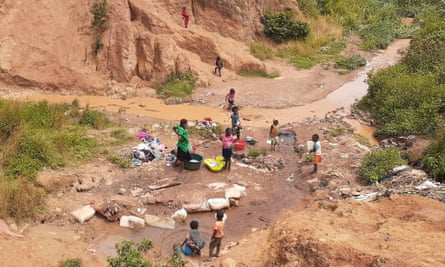
A link between cobalt mining and birth defects has been raised in a Lancet study from 2020 that found the risk of birth defects greatly increased when a parent worked in a copper or cobalt mine.
Women are more likely to come in to daily contact with contaminated water than men, said Van Woudenberg. “They’re not drinking the water but they bathe in it, wash their clothes, household cleaning – all things women are doing. And medical experts have told us that that when the pH level of water is lower, gynaecological issues are more likely.”
Raid and Afrewatch also asked the University of Lubumbashi’s toxicology and environment unit to look examine water samples taken from the Dipeta River; the Katapula, Kalenge and Dilala-UCK rivers, and Lake Kando – the five water bodies identified by local residents as being problematic.
“While the research is still ongoing, preliminary results from March 2024 show that water pH for all of the rivers and the lake assessed is low,” said Van Woudenberg. “The scientists said this was a clear sign that these water bodies are affected by acidified industrial pollution. The scientific researchers assess that, given their acidity levels, the rivers have become unable to host fish, and that their water is toxic for human and animal health.”
Van Woudenberg said Raid had shared its findings with the mining companies located across the copper belt. In response, the companies outlined their commitment to comply with environmental laws and independent auditing, and pointed to the number of cleaner water pumps that they provide to local people.
The report said: “While this partly alleviates the chronic shortage of clean water, our investigation found that none of the mining companies had provided the minimal number of water points required by DRC regulations. Nor did they meet the World Health Organization’s guideline of 20 litres per person per day, the bare minimum required for drinking and basic hygiene.”
Another of the findings, Tobalagba said, was that 75% of people interviewed said that they can’t afford healthcare any more.
“People are becoming poorer because they rely on fishing and agriculture, but because the water is so polluted, the fishing stocks have diminished and crops grown along the water banks have begun to fail,” she said.
The renewed fighting between the Armed Forces of the Democratic Republic of the Congo (FARDC) and M23, a non-state armed group, has displaced at least 150,000 people, more than half of them children, since 2 February. Parents have reported that many children have been separated in the violence, although the number of lost children is unknown. Families are seeking refuge in displacement camps, churches, schools and with host families, with thousands now on the road looking for safety in Goma, the province’s capital.
The use of artillery, drones, and explosives in eastern DRC is killing and injuring civilians and damaging and destroying essential infrastructure, said Save the Children. According to local media sources, 19 people have been killed and 27 others injured in the violence, including three young girls. A market was hit on 7 February, and munitions also landed inside a school courtyard and close to a hospital. All schools in the area remain closed.
Alicia*, who works at a Save the Children partner school in North Kivu, recounted the events on 2 February: “It was last Friday around 5 p.m. that we heard bullets. Everyone fled in their own direction. Some children were even lost and have not yet been found. Many parents are crying about the disappearance of their children, but the number of children lost is not yet known. The road was cut off. Shops were looted. Schools have been closed and children are no longer studying. In addition, we are not going to return unless the situation improves.”
The DRC has long suffered from repeated cycles of influx of refugees, conflicts and unrest. Today, more than 25 million people are in dire need of humanitarian aid to survive and over seven million displaced.
The current wave of violence follows a tumultuous year of heightened outbreaks of conflict in 2023, when intensified fighting in the east of the country between various groups displaced more than 1 million people, including at least 500,000 children. By the end of 2023, North Kivu alone had more than 2.4 million people internally displaced, according to the UNHCR.
Greg Ramm, Save the Children Country Director in DRC said: “Children in eastern DRC are living through yet another a nightmare. Abrupt violence on the weekend has separated children from their families and forcibly torn them away from their homes. Families are now seeking refuge in schools, churches, and hospitals, hoping they won’t get caught in the crossfire. Meanwhile, host families, already stretched thin, are stepping up amid this deepening crisis.
“This region has endured persistent violence, with children growing up in a relentless cycle of death, destruction, and displacement. Children in the DRC are not only witnessing the horrors of conflict but are also being recruited into violent armed groups, facing catastrophic hunger, and enduring sexual abuse. Urgent and resolute action is imperative to break the cycle of suffering for these innocent lives.
“The rights and well-being of children across DRC must be prioritised. Children cannot continue to be caught in the crossfire. Save the Children calls for stronger and more consistent systems to hold to account the perpetrators of crimes affecting children. We call for all those involved in the fighting to affirm and adhere to international laws, human rights provisions, and rules and standards designed to protect children.”
Currently, children and their families are finding it nearly impossible to access services needed for their protection and survival. The only safe route to access the displaced population is via boat.
Save the Children has worked in the DRC since 1994 to meet humanitarian needs linked to the arrival of refugees and the displacement of populations due to armed conflict in eastern provinces. Save the Children has scaled up its humanitarian response to support existing care systems, training local leaders and communities to prevent and respond to exploitation and abuse, and ensuring access to healthcare through mobile clinics. It is also helping children access basic education by building classrooms, training teachers, and distributing learning materials.
UNFPA 15 February 2024
violence mounts in #DRCongo due to prolonged war, women and girls face further displacement, sexual violence and high rates of maternal mortality. See @UNFPA’s list of five ways they can be helped: https://unf.pa/fwc
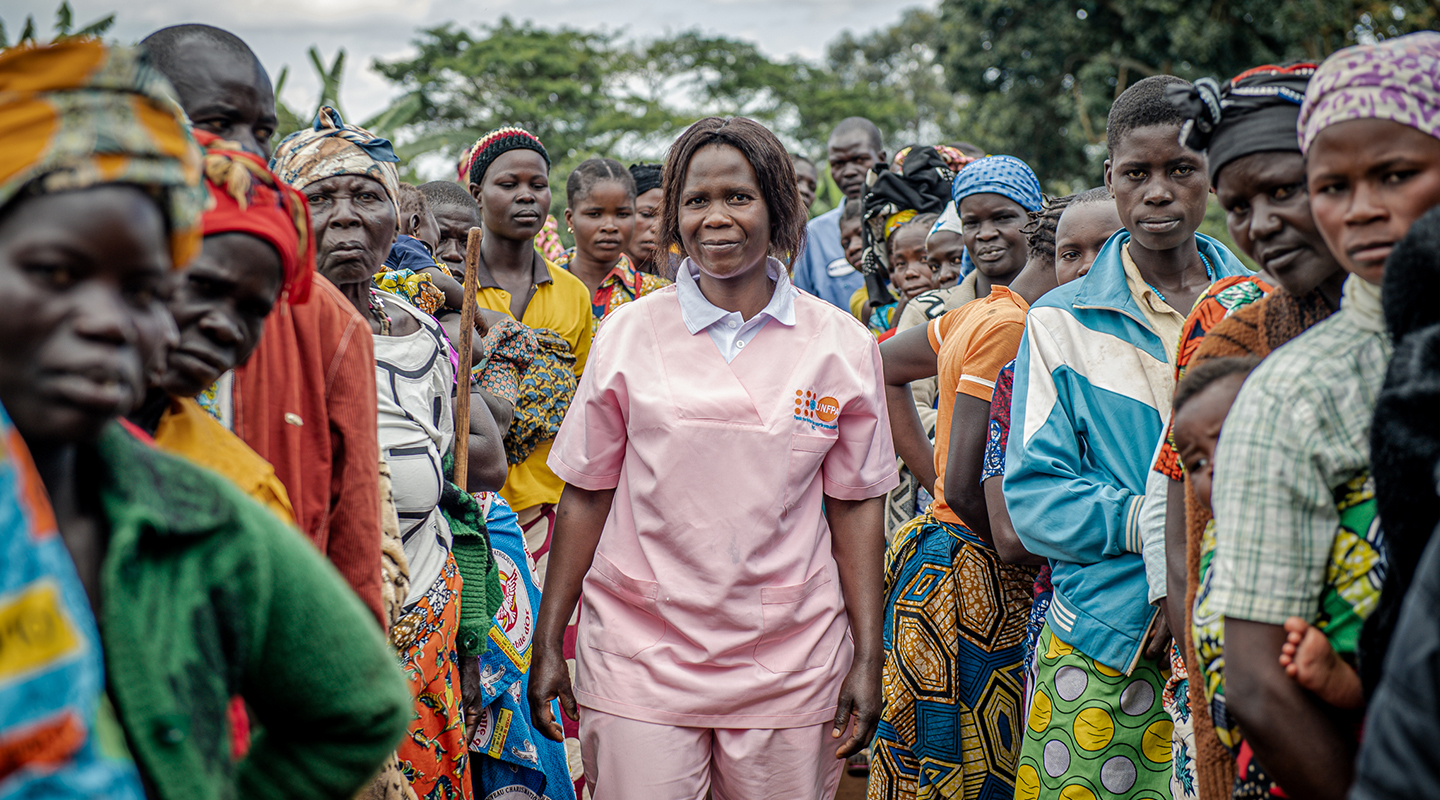
An escalating conflict among armed groups and national armies in the east has forced some 5.8 million people from their homes since March 2022, compounding a longstanding humanitarian crisis in the country – worsened by climate disasters and recurrent disease. Medical infrastructure is poor, and access to reproductive health services is severely constrained. This, amid an alarming spike in gender-based violence.
“In this period of conflict, we live under acute stress,” says midwife Esther Okunia, who has fled her home in Ituri province so often, “it has become a way of life.” Describing the chaos of being uprooted, she says, “Sometimes we travel separately, the father alone, the mother with some of the children – and sometimes, the children without their parents. I always tell my children, ‘When this happens and you’re at school or away from home, follow the crowd, don’t stray and never go off on your own.’”
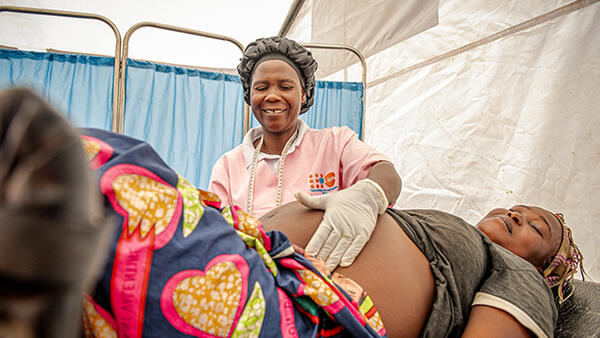 Ms. Okunia performs a prenatal exam.
Ms. Okunia performs a prenatal exam.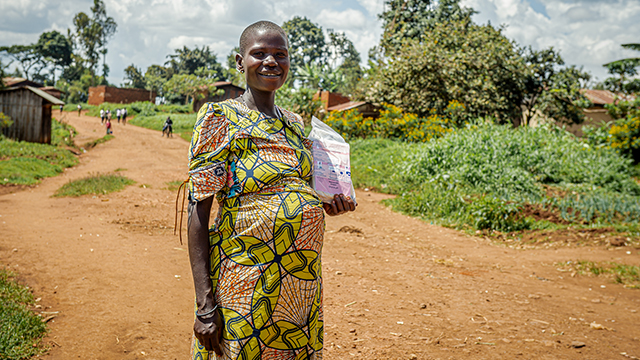 Angélique NKema, a pregnant and displaced mother in Ituri province, receives a kit containing essential supplies from a clinic supported by UNFPA.
Angélique NKema, a pregnant and displaced mother in Ituri province, receives a kit containing essential supplies from a clinic supported by UNFPA. 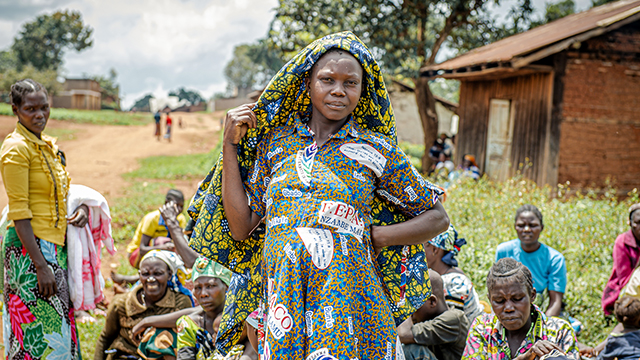 Pregnant women wait to see a midwife at a clinic in the village of Zaa in Ituri province.
Pregnant women wait to see a midwife at a clinic in the village of Zaa in Ituri province. But there’s much more to be done. Here are five actions that leaders must take to change life for women and girls:
Some 7.2 million people across the country are internally displaced, including more than 860,000 women of childbearing age. Many are living in overcrowded sites and shelters – conditions that increase the risk for women and girls of gender-based violence, in addition to unintended pregnancies, unattended obstetrical complications and maternal deaths.
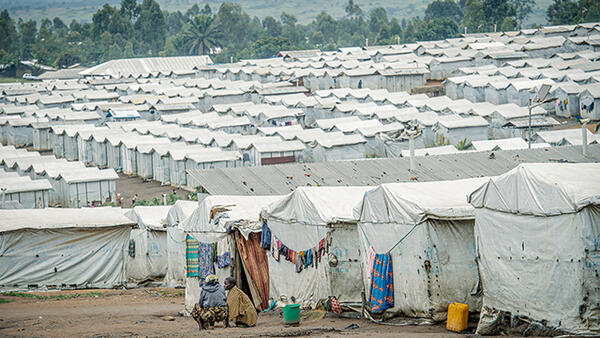 The Kigonze displacement camp stretches for miles in Ituri province.
The Kigonze displacement camp stretches for miles in Ituri province.Amid the fighting in the east, sexual violence – which is increasingly being used by armed groups as a tactic to terrorize and control people – has soared. Women and girls living in displacement camps in these conflict zones are at heightened risk, especially when they need to leave the camps to find supplies for their basic needs, such as firewood for cooking.
That’s what happened to Anny (whose name has been changed for privacy) and her teenage daughter in the Bulengo camp in North Kivu. With no electricity, gas or access to basic services, they had to leave the camp in a quest for firewood to cook meals. As they began to gather wood from a nearby forest, armed men attacked, raping both at gunpoint.
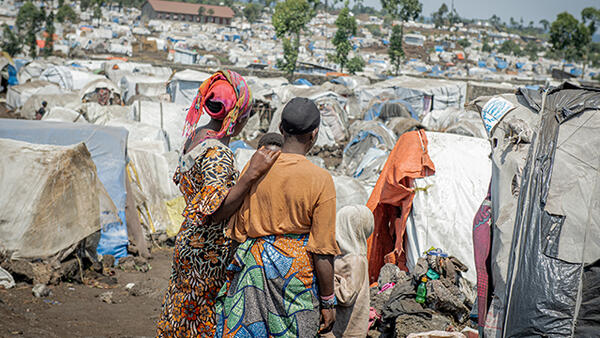
Back at the camp, reeling from the trauma, Anny and her daughter found some much-needed support: At a weekly information session supported by UNFPA, they learned that they could receive medical care and psychosocial support at a mobile clinic and a Safe Space, which helped them begin to regain their footing.
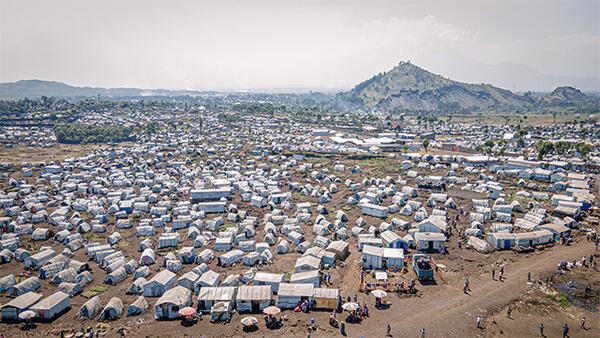 The Bulengo camp serves as a temporary home for tens of thousands of people.
The Bulengo camp serves as a temporary home for tens of thousands of people.For many survivors of sexual violence, access to comprehensive medical and psychological support is limited. Further, many women don’t report cases of rape, despite efforts to raise awareness, amid a culture of silence surrounding sexual violence, says Ms. Okunia, the midwife in Ituri.
In the health facilities and mobile clinics supported by UNFPA, trained professionals provide quality, confidential assistance. But much more support is needed from global donors to meet the dire need.
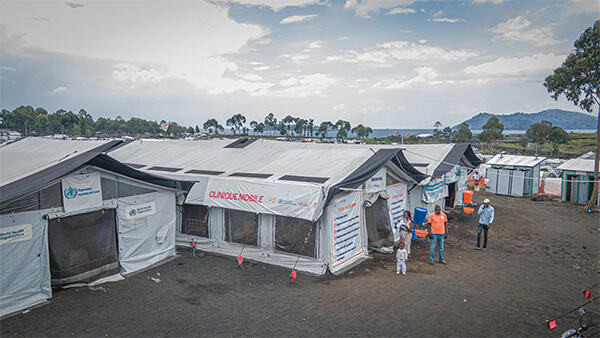
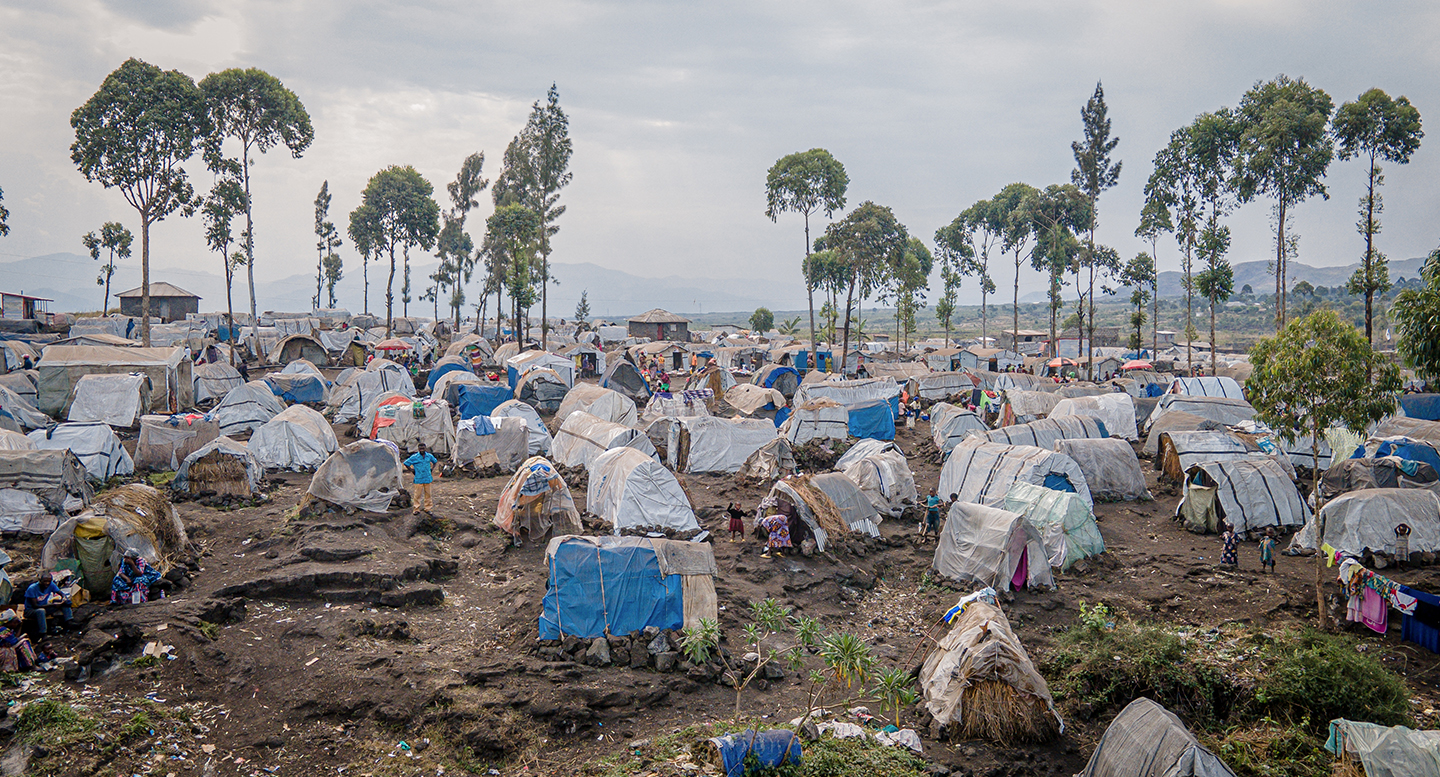 Massive displacement camps such as Bulengo leave women and girls at risk of sexual violence.
Massive displacement camps such as Bulengo leave women and girls at risk of sexual violence.It’s crucial that women and girls play an active role in shaping their future. Raising awareness about sexual and reproductive health services, including family planning, maternal health care and comprehensive sexuality education, can empower them to plan their lives and know their reproductive rights – and to advocate for a social and legal environment in which they can exercise all of their rights.
To that end, in the conflict-ridden eastern provinces of North Kivu, South Kivu and Ituri, initiatives supported by UNFPA have raised awareness among more than 17,000 peopleabout reproductive health, family planning and gender-based violence, while more than 22,000 male and female condoms have been distributed – important steps toward change.
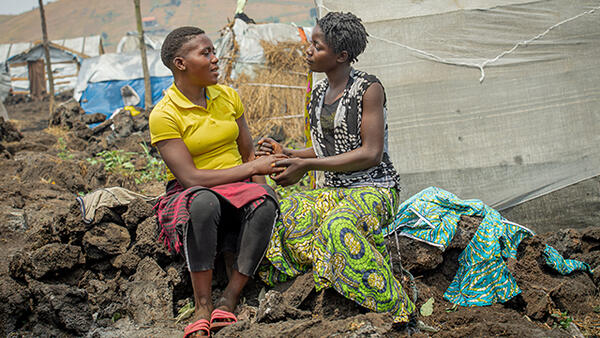
Access to sexual and reproductive health services is extremely challenging for women and girls. Even before the escalation of the current violence in the east, the country’s health infrastructure was weak. The increased violence has further compromised access to maternal and newborn care, including emergency obstetric care, as well as access to family planning.
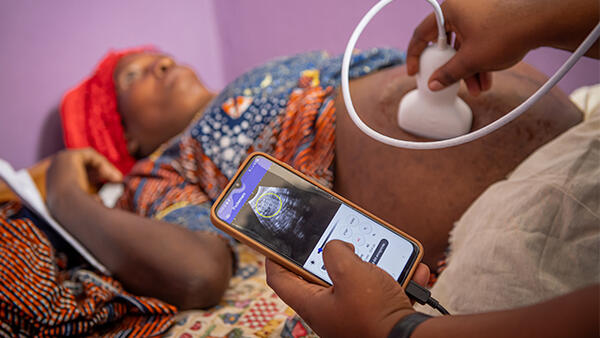
“The conflict poses many risks for pregnant women,” says Ms. Okunia, recalling a harrowing time when she had to put her midwifery skills to use while fleeing war herself: “We were fleeing the clashes between the national army and the rebel group,” she says. “I found a pregnant woman who had gone into labour. She had no one to help her. I took my courage with me, even though I had no equipment on me. I delivered this woman with my bare hands and no protective gloves. I used a reed to cut the umbilical cord of the newborn. This situation endangered the life of the mother and the newborn, as well as my own.”
Now, she says, thanks in part to training and support from UNFPA, she travels with medical supplies. “I always carry a kit with everything I need to save the lives of women and newborns at all times.”
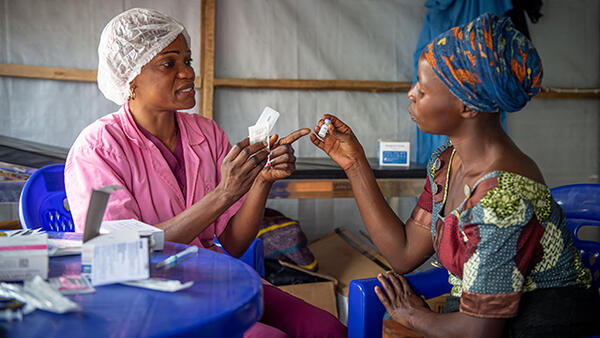
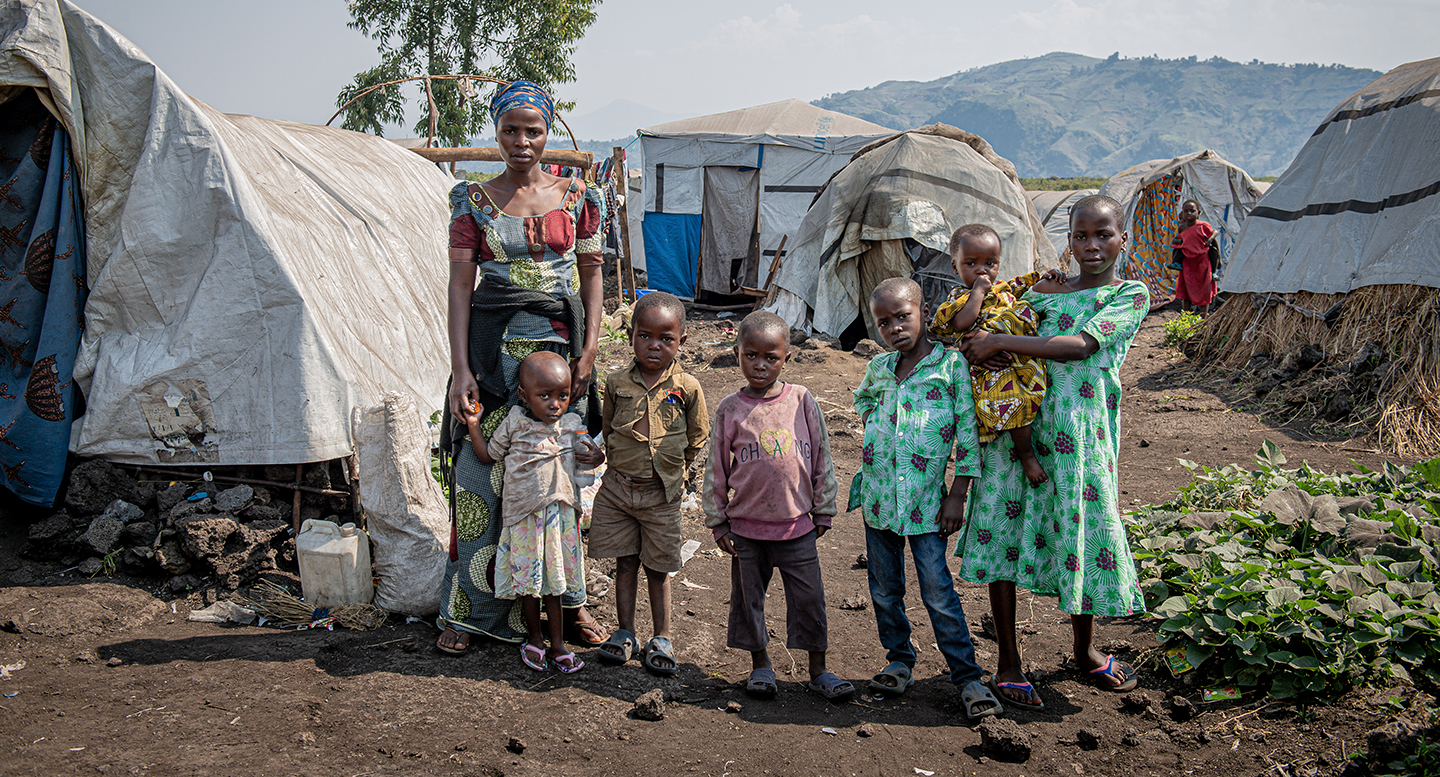
Improving access to reproductive care and family planningwill help build a healthier and more prosperous and resilient population. Currently, 3 to 4 women die every hour from complications of pregnancy and childbirth – an unacceptably high maternal mortality rate. Between 2014 and 2017, the maternal mortality rate fell from 846 to 473 deaths per 100,000 live births, but progress has reversed since then. In 2020, the rate rose to 547 deaths per 100,000 live births.
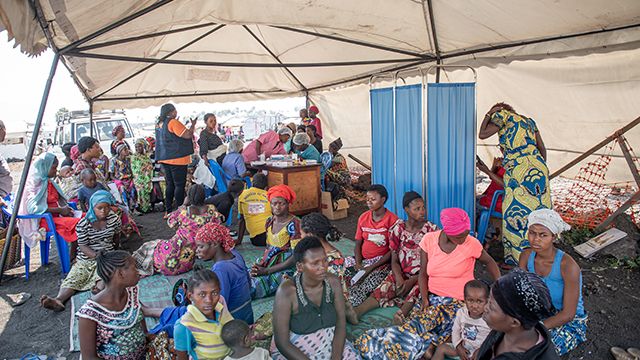
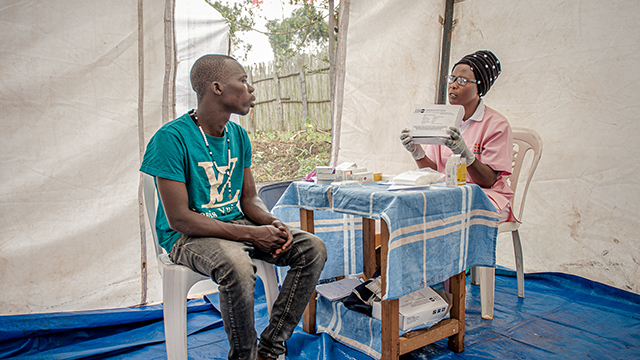
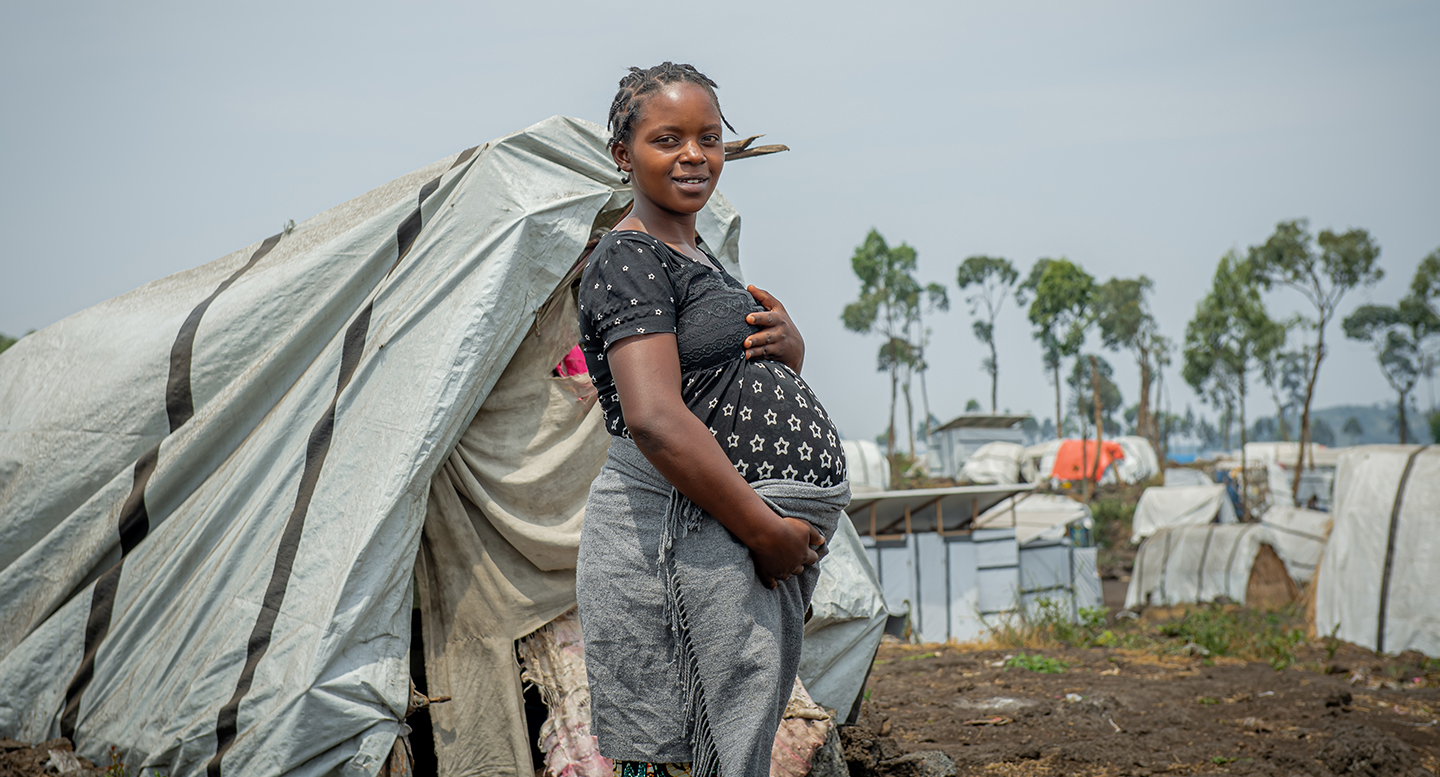
Greater investment in sexual and reproductive health services is vital to get back on track. The involvement of women and girls in initiatives to promote family planning and maternal-health services will help reduce unwanted pregnancies and increase access to vital services.
Women and girls make up most of the population of the country. By strengthening their economic and political capacity and giving them a voice in peacebuilding efforts, they can become empowered contributors to the development of the country – and crucially, they can contribute to a more peaceful future.
Case in point: Peace initiatives supported by UNFPA in the Kirotshe, Nyiragongo and Karisimbi communities involving women and men from different cultures have resulted in the deradicalization of 200 young men living in displacement camps, as well as the commitment of more than 1,000 displaced people to promote intercultural social cohesion and to create guidelines to prevent and manage conflicts in the camps.
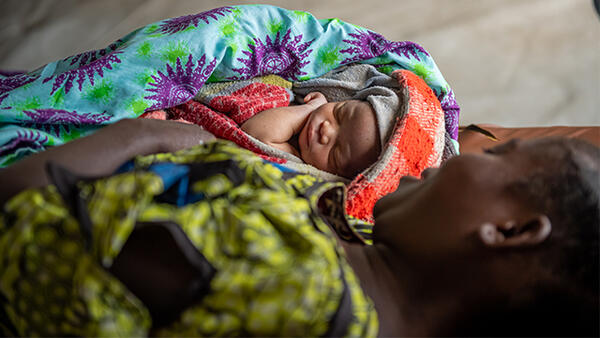
Women’s participation in peace processes contributes to the implementation and durability of peace agreements, research has shown. When women are involved in peace talks, there is a broadening of elements included in the peace agreements, including crucial gender-related issues. There is also greater pressure on the parties to reach an agreement or go back to the negotiating table when the talks falter. Yet there is persistent resistance among global officials to include women. Time to change that.
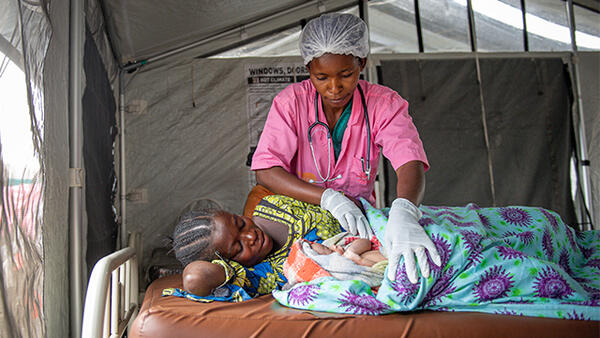
Chronic funding shortages from international donors means vulnerable women and girls are not being reached. In 2023, UNFPA appealed for nearly $98 million in funding to meet the needs of women and girls, but received a paltry $18.6 million. This gap translates into death and suffering for hundreds of thousands of women and girls.
To strengthen reproductive health and protection services for the most vulnerable women and girls in North Kivu, South Kivu and Ituri, UNFPA had appealed for nearly $19 million in 2023, but received only 60 per cent. UNFPA supports 17 Safe Spaces – which provide services including psychosocial support and training in skills such as basket making and fabric dying so that women can have some economic independence – as well as 10 health centres that provide medical care for survivors of gender-based violence.
Flexible and rapid funding will enable UNFPA and its partners to set up more mobile health clinics and Safe Spaces, to distribute vital supplies and to support the deployment of more essential workers, including midwives and gender-based violence case managers, among many others.
